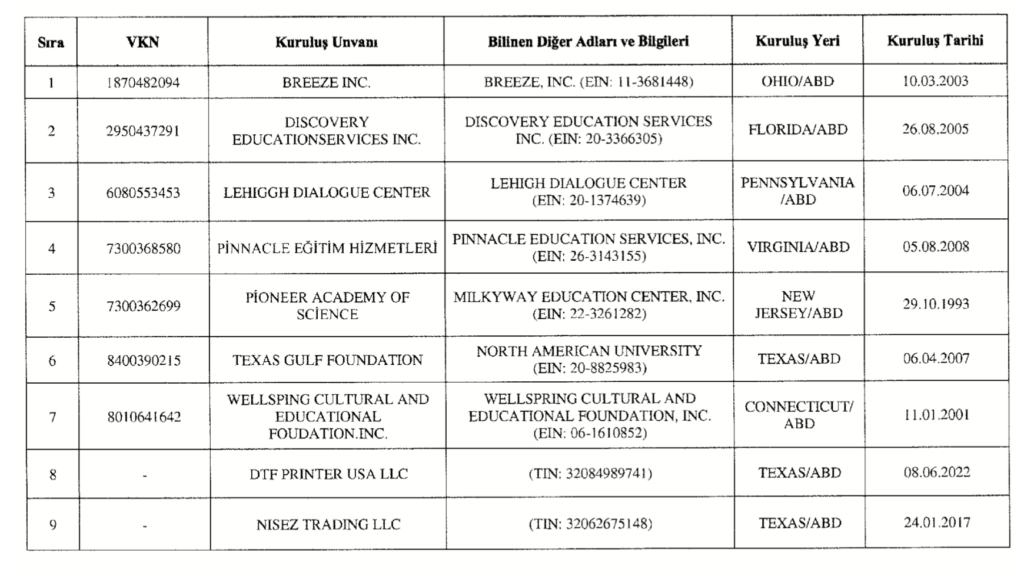Levent Kenez/Stockholm
A shocking secret report from Turkey’s Ministry of Treasury and Finance prepared by the Financial Crimes Investigation Board (MASAK) has revealed a large-scale international intelligence operation that extends beyond Turkish citizens to include foreign nationals. The report suggests that the National Intelligence Organization (MİT) and Turkish diplomatic missions abroad have not only been monitoring individuals suspected of links to the Gülen movement, a group critical of the government, but have also been conducting surveillance on organizations and foreign individuals, raising significant diplomatic and legal concerns. Additionally, the report accuses humanitarian aid organizations of financing terrorism, an allegation widely seen as an effort to discredit their work and stifle opposition.
The Gülen movement, inspired by the late Turkish Muslim scholar Fethullah Gülen, is a faith-based organization. Gülen, who had lived in self-imposed exile in the United States since 1999, passed away on October 20, 2024, from multiple health complications. The movement has long been critical of Turkey’s Islamist President Recep Tayyip Erdogan on various issues, including pervasive government corruption and Turkey’s support for radical jihadist groups. The Erdogan government’s designation of the group as the Fethullah Terrorist Organization (FETÖ), a derogatory acronym coined by the president, has not been acknowledged by democratically governed nations that uphold the rule of law.
The Turkish government’s secret report detailing how international aid organizations and individuals abroad were monitored using information from Turkish intelligence and diplomatic missions. Parts mentioning individuals’ names have been redacted for security reasons:
The 224-page report dated July 22, 2024, identifies intelligence activities in multiple countries, including the United States, Germany, Greece, Belgium, the United Kingdom, France, Denmark, Switzerland, the Netherlands, Tanzania, Romania and New Zealand. According to the document, Turkish intelligence operatives have been tracking individuals and organizations in these countries, often labeling their charitable efforts as fronts for illegal activities. The scope of this operation suggests a systematic campaign aimed at suppressing dissent and criminalizing humanitarian aid.
MİT has been supplying intelligence to the Ministry of Treasury and Finance, which has been using this information to conduct financial investigations and freeze assets under Turkey’s controversial anti-terrorism financing laws. These measures have resulted in the designation of individuals and entities as terrorist supporters without substantial evidence, raising serious concerns about political manipulation of financial regulations. Turkish diplomatic missions have allegedly played a role in these intelligence-gathering operations, further fueling suspicions about the misuse of diplomatic resources for internal security purposes abroad.
Previously leaked documents revealed that in 2016-2017 alone, Turkish embassies profiled over 4,000 dissidents, sharing this information with Turkish intelligence and law enforcement agencies for further legal action.
One of the most alarming aspects of the report is the inclusion of foreign nationals in Turkish intelligence assessments. The document lists individuals residing in countries such as the US, Germany and Greece, accusing them of involvement in terrorist financing or aiding organizations linked to “FETÖ.” This broad-reaching surveillance appears to have led to diplomatic tensions since Turkey reportedly pressures foreign governments to take legal action based on intelligence that lacks transparency and due process.
The report goes further by targeting international humanitarian aid organizations. Groups such as Embrace Relief in the US, Time to Help e.V. in Germany and Pigi Koinsep in Greece have been accused of serving as conduits for financing terrorism. These claims have been met with skepticism as these organizations are legally registered and have been operating for years without previous allegations of wrongdoing. Critics argue that these accusations are politically motivated, aimed at shutting down organizations that provide aid to groups and individuals Turkey deems adversarial.

A particularly troubling aspect of the report is the inclusion of Greek nationals in Turkey’s intelligence assessments. The document names several Greek citizens accused of supporting organizations allegedly linked to “FETÖ.” Among them are mayors, lawyers, film producers and other private citizens, all mentioned in intelligence briefings for allegedly taking part in the activities of groups deemed to be threats by Ankara.

Turkish citizens abroad working with these aid organizations, including directors, volunteers and donors, have also been the subject of criminal investigations. Turkish authorities have launched terrorism-related probes into people merely associated with these groups, effectively deterring engagement in humanitarian efforts.
The report describes one of its primary objectives as facilitating requests to foreign governments for asset freezes while implementing financial restrictions on suspected individuals and organizations in Turkey. This provision, under Turkey’s anti-terrorism financing laws, aims to cut off what Turkish authorities claim to be illicit funding networks. However, critics argue that this strategy is being weaponized to suppress political opponents and silence international dissent.
Published in the Official Gazette on January 7, a listing of US-based foundations and companies whose assets were frozen:

Nordic Monitor previously reported that Turkish diplomats were involved in espionage activities, which have now led to the freezing of assets of US-based organizations. On January 7 the Turkish government froze the assets of nine US-based organizations, including six educational foundations, accusing them of links to the Gülen movement. These organizations are mentioned in the MASAK report.












